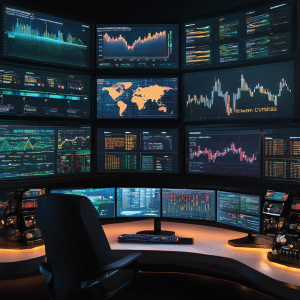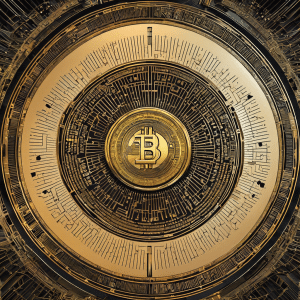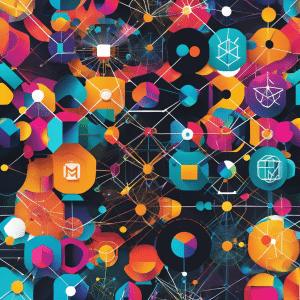Decentralized governance is revolutionizing the way organizations operate and make decisions. As we look ahead to 2024, the landscape of governance is set to undergo even more transformative changes with the emergence of new and innovative tools. These tools will empower individuals and communities to have a greater say in the decision-making processes that affect them.
In the coming years, decentralized governance tools will enable a more inclusive and transparent approach to decision-making. Through blockchain technology, smart contracts, and decentralized autonomous organizations (DAOs), individuals will have the ability to participate in governance processes directly, without the need for intermediaries. This shift towards decentralized governance will not only increase trust and accountability but also foster innovation and collaboration on a global scale.
As we delve into the world of decentralized governance tools in 2024, we will explore the potential benefits and challenges they bring. From voting platforms that ensure secure and tamper-proof elections to governance frameworks that enable efficient and consensus-driven decision-making, these tools will shape the future of governance. Join us as we uncover the exciting possibilities that lie ahead in the realm of decentralized governance.
Understanding decentralized governance
Decentralized governance is a new approach to decision-making that is revolutionizing organizations and communities. Instead of relying on traditional hierarchical structures where power and authority are concentrated in a few hands, decentralized governance distributes power among all participants. In this system, decisions are made collectively, with each individual having a voice and a say in the process.
At the heart of decentralized governance are various tools and technologies that enable a more inclusive and transparent approach to decision-making. One such tool is blockchain technology, which provides a secure and tamper-proof way of recording and verifying transactions. By using blockchain, decentralized governance ensures that decisions and actions can be traced and audited, enhancing trust and accountability.
Another important tool in decentralized governance is smart contracts. These are self-executing contracts with the terms of the agreement directly written into code. Smart contracts eliminate the need for intermediaries and ensure that all parties involved can trust that the terms of the contract will be automatically enforced. This not only streamlines decision-making but also reduces the risk of fraud and corruption.
Decentralized autonomous organizations (DAOs) are also gaining traction in the realm of decentralized governance. A DAO is an organization that is run by smart contracts and operates without a centralized authority. Participants in a DAO collectively make decisions and execute actions according to predefined rules and protocols. This type of governance framework ensures that decisions are made in a transparent and consensus-driven manner.
Furthermore, decentralized governance tools empower individuals and communities to have a greater say in decision-making. They enable anyone with an internet connection to participate in the process, regardless of their location or socioeconomic background. This opens up opportunities for a more diverse range of perspectives and ideas to be considered, fostering innovation and collaboration on a global scale.
Decentralized governance brings about a fundamental shift in how decisions are made. By distributing power and authority, it ensures a more inclusive, transparent, and accountable approach to governance. With the emergence of new tools such as blockchain technology, smart contracts, and DAOs, decentralized governance is poised to become even more transformative in the coming years. Exciting possibilities await as individuals and communities take charge of their own destinies and shape the future through decentralized decision-making.
The impact of decentralized governance on organizations
Decentralized governance is revolutionizing the way organizations operate and make decisions. By distributing power among all participants, it allows for collective decision-making and fosters a more inclusive and transparent organizational structure. This shift towards decentralization brings about several significant impacts on organizations:
1. Enhanced Accountability and Transparency
Decentralized governance tools provide organizations with a higher level of accountability and transparency. With blockchain technology and smart contracts, all transactions and decisions are recorded on an immutable and transparent ledger. This eliminates the need for intermediaries and reduces the risk of fraud or manipulation. By providing a clear audit trail, decentralized governance tools ensure that all participants have access to the same information, promoting trust and fairness within the organization.
2. Empowerment of Individuals and Communities
Decentralized governance allows individuals and communities to have a greater say in decision-making processes. Traditional hierarchical structures often concentrate power in the hands of a few individuals at the top, limiting the involvement of others. With decentralized governance, decision-making becomes more democratic and participatory. Through voting mechanisms and consensus algorithms, everyone has the opportunity to contribute to important organizational decisions. This empowerment fosters a sense of ownership and encourages active participation, leading to increased motivation and engagement within the organization.
3. Stimulates Innovation and Collaboration
Decentralized governance opens up new avenues for innovation and collaboration. By involving a wider range of stakeholders, organizations can tap into a diverse pool of ideas, skills, and perspectives. This diversity enhances creativity and problem-solving capabilities, leading to more innovative solutions. Decentralized governance tools also facilitate collaboration on a global scale. Decentralized autonomous organizations (DAOs) leverage the power of the internet to bring together individuals from different geographical locations, enabling the exchange of knowledge and expertise. This global collaboration has the potential to drive groundbreaking advancements and disrupt traditional organizational models.
Decentralized governance brings about a range of transformative impacts on organizations. It improves accountability and transparency, empowers individuals and communities, and stimulates innovation and collaboration. As organizations embrace these tools and technologies, they position themselves at the forefront of a new era of decentralized decision-making. The shift towards decentralized governance holds immense potential for organizations to adapt, grow, and thrive in a rapidly changing world.
The emergence of new and innovative tools
Decentralized governance is continuously evolving, and significant advancements in technology have paved the way for the emergence of new and innovative tools that further enhance the decentralization movement. These tools are revolutionizing the way organizations make decisions and are instrumental in creating a more inclusive and transparent governance model.
Blockchain Technology
One of the key technologies driving the decentralized governance movement is blockchain. Blockchain is a distributed ledger technology that enables secure and transparent transactions without the need for intermediaries. It creates a tamper-resistant and decentralized system where information can be recorded and verified by multiple participants.
Smart Contracts
Smart contracts are another powerful tool that has gained prominence in decentralized governance. These are self-executing contracts with the terms of the agreement directly written into code. Smart contracts eliminate the need for third-party intermediaries, ensuring that agreements are automatically executed once predefined conditions are met. They offer increased efficiency, transparency, and trust in decision-making processes.
Decentralized Autonomous Organizations (DAOs)
Decentralized Autonomous Organizations, or DAOs, are entities that operate based on smart contracts and blockchain technology. They are self-governing organizations that make decisions collectively through voting mechanisms and consensus algorithms. DAOs enable individuals to participate in decision-making processes, regardless of their geographical location or organizational hierarchy.
Tokenomics
Tokenomics plays a crucial role in decentralized governance by aligning incentives and allowing individuals to participate in the decision-making process. Tokens represent ownership or participation rights within a decentralized governance system, and they can be used for voting, staking, or earning rewards. Tokenomics creates a more inclusive and participatory environment, enabling stakeholders to have a say in the governance of an organization.
These emerging tools are transforming the way organizations operate, making decision-making processes more transparent, inclusive, and efficient. They empower individuals and communities, giving them a greater voice in shaping the future direction of organizations. With the continued advancement of these tools, we can expect to see even more innovative ways of decentralized governance in the years to come.
Empowering individuals and communities through decentralized governance
Decentralized governance is not just revolutionizing organizations and decision-making processes; it’s also empowering individuals and communities like never before. With the emergence of blockchain technology, smart contracts, decentralized autonomous organizations (DAOs), and tokenomics, individuals and communities have a greater voice in shaping the future direction of organizations.
Transparency and Inclusivity
Decentralized governance tools have made decision-making processes more transparent and inclusive. In traditional centralized governance structures, decisions are often made by a select few, leaving individuals and communities feeling excluded and powerless. However, with decentralized governance, power is distributed among all participants, ensuring that decisions are made collectively and transparently.
Blockchain technology, for example, offers a decentralized and immutable ledger that records all transactions and interactions. This transparency allows individuals and communities to monitor and verify decision-making processes in real-time, ensuring that they are fair and in line with their interests.
Enhanced Participation
Decentralized governance tools also empower individuals and communities by enhancing their participation in decision-making processes. In traditional centralized structures, individuals may feel disconnected from the decisions that directly affect them. However, with decentralized governance, individuals can actively participate in the decision-making process through voting mechanisms facilitated by smart contracts and DAOs.
Smart contracts enable the execution of predefined rules and agreements automatically without the need for intermediaries. This eliminates the dependency on centralized authorities and allows individuals to directly participate in decision-making processes. DAOs, on the other hand, are organizations that are governed by smart contracts, enabling collective decision-making without the need for hierarchical structures.
Economic Empowerment
In addition to transparency and participation, decentralized governance tools offer economic empowerment to individuals and communities. Tokenomics, the study of tokens and their economic systems, plays a crucial role in this process. With tokenomics, individuals can have ownership and control over the organizations they are part of.
Tokens represent a stake in the organization and give individuals the opportunity to participate in its decision-making process. This economic empowerment encourages individuals to actively contribute and collaborate, as their efforts directly impact the value of the tokens they hold.
Decentralized governance tools have the potential to unlock the untapped potential of individuals and communities. They enable transparency, inclusivity, and enhanced participation, empowering individuals to shape the future of organizations. As the tools and technologies continue to evolve, we can expect even more innovative ways of decentralized governance in the years to come.
- Decentralized governance tools
The role of blockchain technology, smart contracts, and DAOs
Blockchain technology, smart contracts, and decentralized autonomous organizations (DAOs) play a critical role in enabling decentralized governance. These tools provide the infrastructure and mechanisms necessary for decision-making to be transparent, trustless, and distributed among all participants. Let’s delve into how each of these tools contributes to the revolution of decentralized governance.
Blockchain Technology:
Blockchain technology serves as the foundation of decentralized governance. It is a transparent and immutable ledger that records all transactions and interactions within a decentralized network. By using cryptography and distributed consensus algorithms, blockchain technology ensures that the information stored in the ledger is secure, tamper-proof, and accountable. With its decentralized nature, blockchain eliminates the need for intermediaries and allows participants to verify and validate transactions independently, fostering trust and transparency.
Smart Contracts:
Smart contracts are self-executing agreements coded on blockchain platforms. These contracts automatically execute predefined actions when certain conditions are met. Smart contracts eliminate the need for intermediaries or third parties to enforce agreements, as the code itself enforces compliance. By removing the need for intermediaries, smart contracts reduce costs and risks and enhance the efficiency of decision-making processes. They enable organizations to automate various aspects of governance, such as voting, fund management, and distribution of rewards.
Decentralized Autonomous Organizations (DAOs):
Decentralized Autonomous Organizations, or DAOs, take the concept of decentralized governance to the next level. DAOs are organizations governed by smart contracts and managed by a community of participants. They enable decision-making to be inclusive and accessible to anyone holding the organization’s native tokens. DAOs distribute power and decision-making authority among all participants, creating a more democratic and transparent governance structure. With DAOs, individuals have the opportunity to actively contribute to the decision-making process and shape the direction of organizations.
Blockchain technology, smart contracts, and DAOs are the building blocks of decentralized governance. These tools empower individuals and communities, enhance transparency and inclusivity, and enable more active participation in decision-making processes. As these tools evolve, we can expect even more innovative ways of decentralized governance in the years to come.
Advantages of decentralized governance
Decentralized governance has numerous advantages that make it an increasingly popular choice in the modern world. Here are some key benefits that you can enjoy with decentralized governance tools:
- Transparency: With decentralized governance, all decision-making processes are transparent and publicly accessible. This means that you can easily track and understand how decisions are made and how they affect you.
- Trustless: Traditional governance often relies on intermediaries and trust in central authorities. However, decentralized governance eliminates the need for trust by using blockchain technology to ensure accuracy and security. Trust is instead replaced by verifiable data and consensus algorithms.
- Inclusivity: Decentralized governance allows for more inclusive decision-making processes. Anyone with an internet connection can participate and contribute to discussions and proposals. This creates a more diverse and representative decision-making body, giving everyone a voice.
- Democratic: Decentralized governance tools promote democratic principles by enabling community voting and decision-making. This ensures that decisions are made based on majority consensus, making the process more fair and equitable.
- Efficiency: Decentralized governance eliminates bureaucracy and streamlines decision-making. Smart contracts in particular automate governance processes, reducing paperwork and minimizing the need for intermediaries. This increases efficiency and reduces costs.
- Resilience: Decentralized governance systems are inherently more resilient to failures and attacks. Since there is no single point of failure or control, the network can withstand technical disruptions or attempts at manipulation.
- Security: Blockchain technology, the foundation of decentralized governance, provides enhanced security for transactions and data. The immutable and tamper-proof nature of the blockchain ensures that records and decisions cannot be easily altered or manipulated.
Decentralized governance offers a range of advantages that contribute to a more open, fair, and inclusive decision-making process. As these tools continue to evolve and gain traction, we can expect even more innovative ways of decentralized governance in the future.
Challenges of decentralized governance
While decentralized governance has many advantages, it is not without its challenges. Here are some of the key challenges that arise when implementing decentralized governance tools:
- Lack of Regulatory Framework: One of the main challenges is the absence of a regulatory framework specifically designed for decentralized governance. As these tools continue to evolve, there is a need for clear guidelines and regulations to ensure their proper functioning and protect the interests of all stakeholders.
- Scalability: Decentralized governance tools may face scalability issues when it comes to handling a large number of participants, transactions, or decisions. As more people join the network, the system may encounter bottlenecks, leading to slower processes and reduced efficiency. Finding solutions to scale these tools effectively is crucial for their widespread adoption.
- Complexity: Implementing decentralized governance tools requires technical skills and expertise. The complexity of blockchain technology and smart contracts may pose a barrier to entry for those who are not familiar with these concepts. Simplifying the user experience and providing user-friendly interfaces can help overcome this challenge.
- Governance Coordination: Decentralized governance requires coordination among participants to make decisions and implement changes. Achieving consensus on important matters can be time-consuming and challenging, especially when there are diverse perspectives and interests within the network. Effective governance coordination mechanisms need to be in place to ensure efficient decision-making.
- Security Risks: While blockchain technology offers inherent security features, decentralized governance tools are not immune to security risks. Smart contract vulnerabilities, hacking attempts, and manipulation of voting processes can undermine the integrity of the governance system. Robust security measures need to be implemented to mitigate these risks and protect the network against malicious attacks.
- Resistance to Change: Introducing decentralized governance tools often requires a shift in mindset and a willingness to embrace change. Some individuals or organizations may be resistant to relinquishing centralized control or may have concerns about the transparency and accountability of decentralized systems. Overcoming this resistance and building trust in decentralized governance may take time and education.
By acknowledging these challenges, stakeholders can work towards addressing them and improving the effectiveness of decentralized governance tools. As efforts continue to overcome these obstacles, we can expect decentralized governance to become more robust and widely adopted by organizations and communities in the future.
Voting platforms for secure and tamper-proof elections
Decentralized governance tools offer the potential for secure and tamper-proof elections through innovative voting platforms. These platforms leverage blockchain technology to provide a transparent and trustworthy voting process that can be audited by anyone.
Here are a few key features of voting platforms in the realm of decentralized governance:
- Transparency: Voting platforms built on blockchain technology provide a transparent record of all votes cast, which can be accessed and verified by anyone. This transparency ensures that the voting process is fair and accountable, minimizing the potential for fraud or manipulation.
- Immutability: Once a vote is recorded on the blockchain, it cannot be altered or tampered with. This immutability ensures the integrity of the voting process and prevents any malicious actors from changing the outcome of an election.
- Security: Voting platforms utilize robust cryptographic algorithms to secure the voting data and protect it from unauthorized access. The decentralized nature of blockchain technology makes it difficult for hackers to compromise the system, adding an extra layer of security to the voting process.
- Tamper-Proof: By using decentralized networks, voting platforms eliminate the need for a central authority, making it nearly impossible to tamper with the election results. The data is distributed across multiple nodes, making it resilient to attacks and ensuring the accuracy and validity of the voting outcome.
- Inclusivity: Decentralized voting platforms have the potential to overcome geographical barriers and enable more people to participate in the democratic process. With online voting capabilities, individuals can cast their votes remotely, promoting inclusivity and increasing voter turnout.
- Auditability: Blockchain technology allows for a thorough audit of the voting process. Each vote is recorded on the blockchain, creating an immutable trail of evidence that can be reviewed and audited to ensure the integrity of the election.
- Efficiency: Decentralized voting platforms streamline the election process by automating tasks such as voter registration and counting of ballots. This increases the efficiency of the voting process and reduces the time and resources required for conducting elections.
While decentralized voting platforms offer numerous benefits, it is essential to address the challenges surrounding their implementation. These challenges include scalability issues, coordination of governance, regulatory frameworks, and resistance to change. Overcoming these hurdles will be crucial in realizing the full potential of decentralized governance tools in 2024 and beyond.
Governance frameworks for efficient and consensus-driven decision-making
Decentralized governance tools have the potential to revolutionize decision-making processes by introducing efficiency, transparency, and inclusivity. In order to maximize the benefits of these tools, it is important to establish robust governance frameworks that facilitate efficient and consensus-driven decision-making. These frameworks not only provide a structure for decision-making but also ensure that the voices of all participants are taken into account.
One key aspect of governance frameworks is the mechanism used for decision-making. In a decentralized system, decision-making is often done through consensus, where participants work together to reach agreement on a particular issue. This consensus-based approach encourages collaboration and fosters a sense of collective ownership in the decision-making process. It also reduces the influence of individual biases and promotes the overall well-being of the community.
To ensure efficient decision-making, governance frameworks should also incorporate clear and well-defined processes. These processes outline how decisions are made, how information is shared, and how conflicts are resolved. By establishing these processes, participants can navigate through the decision-making journey smoothly and avoid unnecessary delays or confusion. It also provides a sense of predictability and stability, which are crucial for maintaining trust and confidence in the governance system.
Transparency is another fundamental principle that should be integrated into governance frameworks. Allowing participants to access relevant information about the decision-making process promotes accountability and trust. Transparent governance frameworks enable participants to assess the legitimacy of decisions, understand the rationale behind them, and hold decision-makers accountable for their actions.
While governance frameworks should provide a robust structure for decision-making, it is important to strike a balance between flexibility and rigidity. The framework should allow for adaptability to changing circumstances and evolving needs of the community, while still maintaining consistency and fairness in decision-making. This flexibility ensures that the governance system can effectively respond to new challenges and opportunities without compromising on its core principles.
Governance frameworks play a crucial role in ensuring efficient and consensus-driven decision-making within decentralized governance tools. By incorporating mechanisms for consensus, well-defined processes, transparency, and a balance between flexibility and rigidity, these frameworks provide a solid foundation for the effective functioning of decentralized systems. As the adoption of decentralized governance tools continues to grow, the development and refinement of governance frameworks will become increasingly important.
The future of decentralized governance
As we look ahead to the year 2024, the future of decentralized governance appears incredibly promising. The rapid advancement of technology and the increasing recognition of its potential benefits have paved the way for the widespread adoption of decentralized governance tools. Here are a few key trends that we expect to shape the future of decentralized governance:
1. Increased Efficiency and Transparency: Decentralized governance enables decision-making to be more efficient and transparent. With the use of decentralized voting platforms, decisions can be made in a quick and secure manner, eliminating the need for lengthy bureaucratic processes. This not only saves time but also fosters trust and confidence among the participants.
2. Enhanced Security and Tamper-Proof Elections: One of the major advantages of decentralized voting platforms is the ability to ensure the integrity of elections. By leveraging blockchain technology, these platforms provide a secure and tamper-proof environment where votes cannot be manipulated or altered. This eliminates the risk of electoral fraud and ensures a fair and transparent election process.
3. Empowered Participation and Inclusion: Decentralized governance tools empower individuals to actively participate in decision-making processes. Through decentralized voting platforms, every participant has an equal opportunity to voice their opinions and contribute to the decision-making process. This level of inclusion fosters a sense of ownership and engagement among participants, leading to more effective and consensus-driven decision-making.
4. Global Collaboration and Cross-Border Governance: Decentralized governance tools have the potential to facilitate global collaboration and cross-border governance. With the removal of geographical barriers and the ability to connect people from different parts of the world, decentralized governance platforms can enable the sharing of knowledge, resources, and ideas on a global scale. This opens up possibilities for cross-border collaboration and cooperation on various issues that require global consensus and coordination.
5. Continued Evolution and Adaptation: As decentralized governance tools continue to evolve and more organizations embrace this approach, we can expect constant innovation and adaptation to meet the changing needs of the participants. New features and functionalities will be developed to enhance user experience and address any shortcomings in the existing systems. This continuous improvement will ensure that decentralized governance remains a robust and effective tool for decision-making.
The future of decentralized governance holds immense potential. With increased efficiency, enhanced security, empowered participation, global collaboration, and continuous evolution, decentralized governance tools will play a significant role in shaping the way organizations and communities make decisions in the years to come.
Conclusion
Decentralized governance tools are poised to revolutionize decision-making processes in the future. By leveraging blockchain technology and decentralized voting platforms, organizations can ensure secure and tamper-proof elections, while also promoting transparency and efficiency.
The future of decentralized governance holds great promise. As technology continues to advance, we can expect increased efficiency and transparency in decision-making processes. With enhanced security measures, elections will become more reliable, fostering trust among participants.
Furthermore, decentralized governance tools will empower individuals to participate in decision-making, ensuring inclusivity and diverse perspectives. This will lead to better outcomes and a more engaged society.
Global collaboration and cross-border governance will also become more prevalent, allowing organizations to work together on shared challenges. This will lead to more effective and coordinated decision-making on a global scale.
As decentralized governance tools continue to evolve and adapt, they will shape the way decisions are made in the future. By embracing these tools, organizations can foster a more democratic and participatory approach to governance.
Decentralized governance tools offer numerous advantages and are set to play a significant role in shaping decision-making processes in the years to come. Embracing these tools will lead to more efficient, transparent, and inclusive governance structures.
Frequently Asked Questions
Q: What is decentralized governance?
A: Decentralized governance refers to a system where decision-making authority is distributed across a network of individuals or entities, rather than being centralized in a single authority. This allows for more efficient and consensus-driven decision making.
Q: What are the advantages of decentralized voting platforms?
A: Decentralized voting platforms offer secure and tamper-proof elections. They ensure transparency, enhance security, and allow for empowered participation and inclusion in decision-making processes.
Q: Why is establishing robust governance frameworks important?
A: Robust governance frameworks are essential to facilitate efficient decision-making and ensure fair and inclusive processes. They provide a structure that allows for effective coordination and collaboration among participants.
Q: What trends are expected to shape the future of decentralized governance?
A: Key trends that are expected to shape the future of decentralized governance include increased efficiency and transparency, enhanced security, empowered participation and inclusion, global collaboration, and continued evolution and adaptation.
Q: How will decentralized governance tools affect decision-making in the future?
A: Decentralized governance tools will play a significant role in shaping decision-making in the future. They will enable more inclusive, transparent, and efficient processes, ensuring that decisions are made by consensus and in the best interest of the community.








